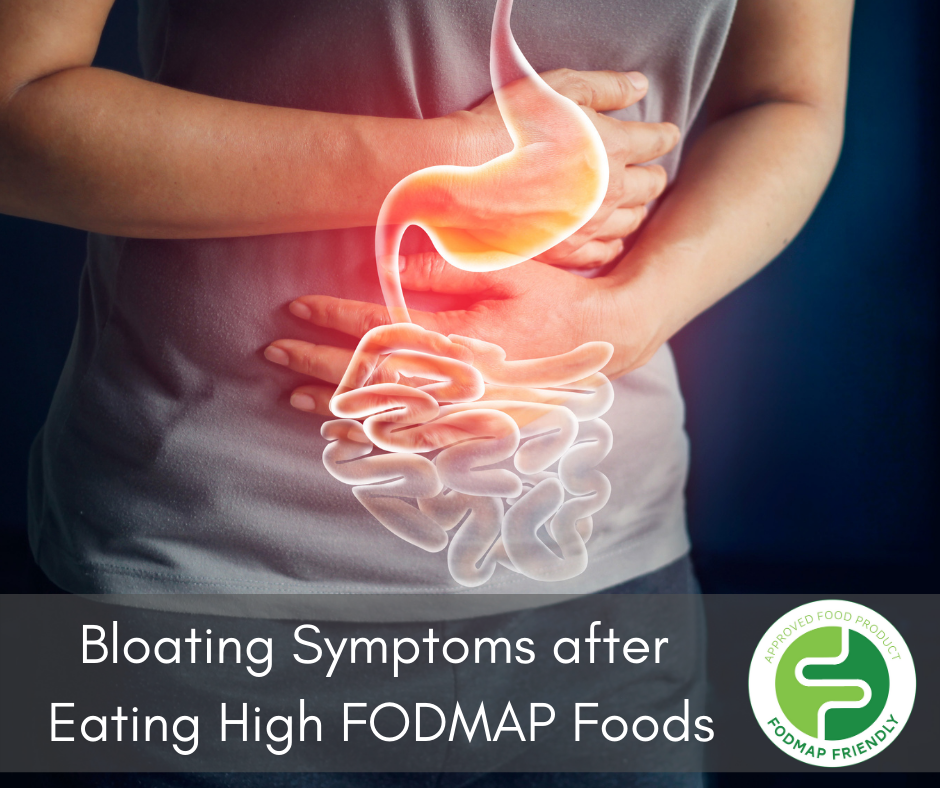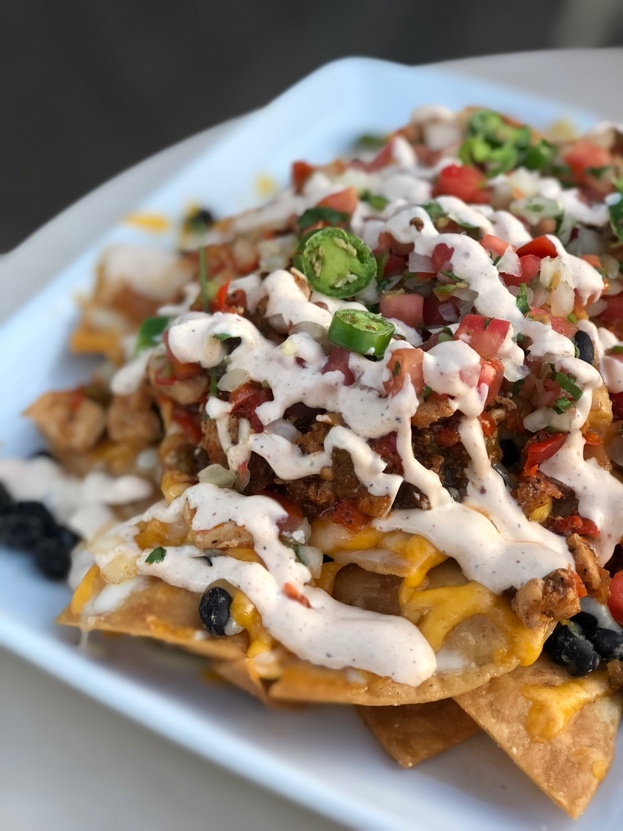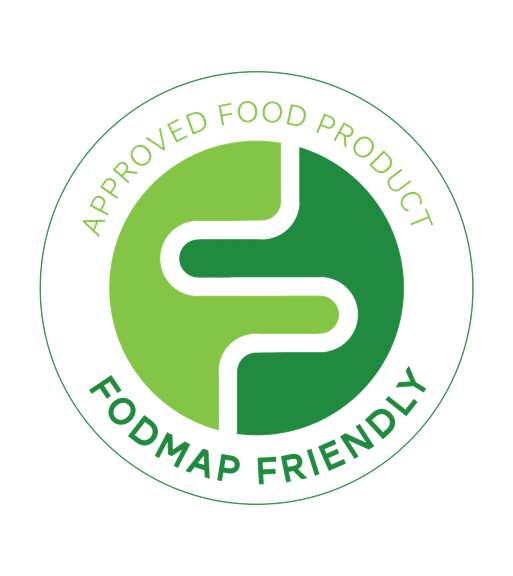Why does eating high FODMAP foods make me feel bloated?
Posted on October 07, 2020
Have you ever eaten a meal high in FODMAPs only to gaze down to your stomach and wonder how it spontaneously ‘ballooned’ out? Alternatively, have you ever felt as though it only takes a gulp of air to bloat you? ‘Bloating’, or the feeling of a bursting and swollen abdomen is a common symptom of IBS.
Although a bit of abdominal distension is a normal part of the digestion process, there are some cases in which people experience uncomfortable, persistent bloating that can negatively impact their quality of life. This is what we call chronic bloating. Within chronic bloating, those with IBS typically experience functional bloating. Although there is no specific internal or psychiatric cause with functional bloating, it is unpredictable and often painful, occurring after a meal or near the end of the day. 1
What is happening in my body to cause bloating?
Our intestinal organs are very clever and have ‘stretch sensors’ in their muscular wall that are able to sense when the organ is distended. People with IBS tend to have particularly sensitive stretch sensors. When these sensors feel over stretched, our body may interpret this as bloating.
Let’s now have a look at what is happening in your body to cause bloating at each step of the digestion process. Imagine you’ve eaten a big bowl of chilli. A three-bean mix of kidney beans, chickpeas & black beans; onion and garlic topped with sour cream. There are a few different FODMAPs (namely fructans, GOS and lactose) going on in this dish!
When you swallow a mouthful of your chilli, it ‘boards the train’ of your gastrointestinal system. After the chilli is mixed and grinded in the stomach, it is passed through to the small intestine where important nutrients are extracted. Carbohydrates are broken down to sugars to be absorbed into the blood stream. However, some carbohydrates, known as FODMAPs are unable to be absorbed in the small intestine for some individuals.
It is the job of the large intestine (also known as the colon) to process and get rid of waste, while absorbing some nutrients and water. Usually, before the remnants of our chilli enter the large intestine, most of the nutrients have been absorbed into the body and the colon simply acts as a place for water reabsorption. However, if the food particles (like particles from the chilli you ate) are moving slowly through the colon, too much water is absorbed. With less water in the large intestine, the stool can harden and become more difficult to pass.
This can leave the stool to ‘hang out’ for longer in the large intestine, where the food particles continue to ferment and produce excessive gas and pressure in the bowel. Consequently, this results in bloating and excess gas production (wind), which are characteristic symptoms of IBS.
The gut wall is also lined with nerves which can be more sensitive in people with IBS. When the gut stretches from increased pressure, the nerves in our gut tend to overreact. This leads to a feeling of discomfort and pain in the abdomen.
When the nerves in our gut overreact to being stretched, our level of discomfort increases. Usually, when a person eats a meal that causes some gas production (such as a chilli full of fibre), the abdominal wall tightens, and the diaphragm rises into the chest, making room for the gut contents to stretch out a bit more. However, in people who suffer from chronic bloating, the diaphragm unfortunately likes to do the opposite – it pushes down, which causes the abdomen to bulge. Hence, we see a more bloated belly.
Watch this Video to See the Journey the FODMAPS take and How they Cause Bloating
What difference does eating FODMAP Friendly Certified foods make to bloating symptoms?
The FODMAP Friendly mission is to assist people with IBS symptoms to shop and eat with confidence. We help do this through our FODMAP Friendly accreditation – the only registered certification trademark worldwide, certifying FODMAP levels in food products that have been laboratory tested to be low in FODMAPs. Levels of FODMAPs in food vary depending on the portion size and the way the food is processed. Therefore, it can often be tricky to read food labels to work out if a food is low FODMAP. Many food companies are now certifying their products as FODMAP Friendly.
If you see the green FODMAP Friendly logo on any food product, you have the ‘green light’ and can be rest assured that the product is suitable for consumption while following a low FODMAP diet at the packet serve size. This means that your digestion of the food should run smoothly in the small intestine rather than the food being trapped in the large intestine and producing uncomfortable symptoms such as bloating.
You can browse the extensive range of certified FODMAP Friendly products here and be sure to look out for our logo next time you’re at the supermarket.
The importance of getting medical advice for chronic, continuous bloating
It is important to see a Doctor and Dietitian for chronic, continuous bloating. Chronic bloating could be a result of more sinister conditions such as bowel obstructions or bowel cancer, and your Doctor can help you address the root cause of the problem.
A FODMAP-specialised Dietitian is a great person to have on your IBS management team. A Dietitian can perform a full patient assessment, including a symptom assessment and diet history. They will be able to answer all of your FODMAP questions, and help you choose the best course of action when it comes to the way in which you’d like to implement the diet. Also, there is greater risk of nutritional inadequacy when eating low FODMAP which could lead to nutritional deficiencies in the long term. Dietitians will help ensure that you are meeting all of the nutritional requirements when eating low FODMAP.
When you try to embark on the low FODMAP diet yourself, it can be very easy to make mistakes and feel discouraged. A Dietitian will equip you with the knowledge and tools you need to succeed.
In Summary
Bloating is a normal part of digestion but can be a cause for concern if you feel as though your bloating after meals is painful and uncomfortable. The gut bacteria are responsible for producing gas as a by-product of fermentation which can go on to distend the abdomen. Dysregulated diaphragm function can also contribute to bloating. High FODMAP foods tend to be gas-inducing, hence limiting the amount of FODMAPs consumed in one meal may help reduce bloating. FODMAP Friendly Certified foods can greatly assist in your low FODMAP shopping experience, and a Dietitian can give you personalised support in working out which high FODMAP foods or meals may contribute to your bloating.
Written by: Charlotte Barber (Student Nutritionist)
Reviewed by: Kiarra Martindale and Rebecca Ponsford (Accredited Practising Dietitians)
1. Sullivan S. N. (2012). Functional abdominal bloating with distention. ISRN gastroenterology, 2012, 721820.













